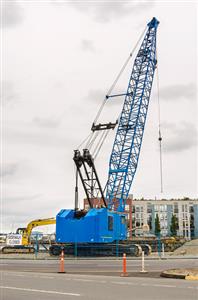
Crane valuation can seem like a complicated process, especially when there are a range of different types of cranes being considered. However, there are also a certain amount of common areas between all types of cranes. How does the condition of these different areas impact the overall value of the crane? Here's a quick look at common points in crane appraisal, regardless of the type of crane that is involved.
What Are Some Common Points in All Kinds of Crane Valuation?
- Types of Cranes Appraised: What kind of crane is being valued? There are a wide range of different crane types, which often have very different values. Maybe you need a telescoping crane valued that is used for transporting materials to areas of different heights. A crawler crane used to navigate poor soil conditions may have very different appraisal points than a tower crane used to lift materials up to the top of a skyscraper. Knowing what type of crane is involved helps the appraiser move on to the next steps.
- Hydraulics and Mechanical Systems: As the heart of any crane, poorly-functioning hydraulics or mechanical systems can lead to early failure or reduce the expected useful lifespan of the equipment. The appraiser will take a solid look at the functionality of the equipment, possibly taking into account fluids tests, stress tests and video to determine whether everything is functioning as it should be.
- History of Repairs and Maintenance: Time to dig out your maintenance and repair logs! By looking over this paperwork, the valuation specialist can get a good picture of whether the equipment has been properly maintained and whether it was immediately taken out of service when a problem was noted or if it continued in use, which may impact its expected remaining useful lifespan, which in turn will impact its value.
- Manufacturer and Model: Just like cars, some manufacturers and specific models will have a reputation for longevity and durability, while others do not. This information will be taken into account by the equipment appraiser during the valuation process as they consider how well that manufacturer and model have held up in the field in the past. As you may expect, equipment that performs well for a longer length of time has a much better value than equipment that performs poorly or fails early.
- Additional Kits or Options: If you've upgraded your equipment after you purchased it or paid more for specific options, your equipment valuation specialist will take that additional value and functionality into account when the crane is being valued. This can include an upgraded radiator kit to improve cooling, a stronger hydraulic system for a boom or any number of other options that may have been improved during or after purchase.
By having a better idea of how crane valuation is approached regardless of the type of crane involved, you can make a better judgment call when purchasing your next crane. But what if you need to know the value of a crane that you currently own or are considering purchasing or selling? If you're making this type of investment in your business, it's important to have an equipment appraisal performed by an accredited valuation specialist. Working with an accredited appraiser ensures that your interests are protected during the process.

